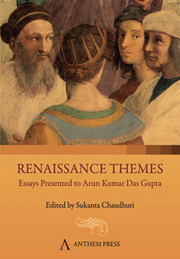Book contents
- Frontmatter
- Contents
- Preface
- List of Contributors
- Arun Kumar Das Gupta
- The Renaissance God as Man of Letters
- Ramist and Senecan Elements in Joseph Hall's The Art of Divine Meditation
- Hypocrite Lecteur: Reading on the Early Modern Stage
- Vertigo
- Folly and Androgyny: Shakespeare's King Lear
- ‘Fatal Visions’ in Macbeth
- The Miltonic Dissimile: Language and Style in Paradise Lost, Book 4
- ‘A Moving Grave’: Positioning Samson Agonistes
- Plate section
Arun Kumar Das Gupta
Published online by Cambridge University Press: 05 March 2012
- Frontmatter
- Contents
- Preface
- List of Contributors
- Arun Kumar Das Gupta
- The Renaissance God as Man of Letters
- Ramist and Senecan Elements in Joseph Hall's The Art of Divine Meditation
- Hypocrite Lecteur: Reading on the Early Modern Stage
- Vertigo
- Folly and Androgyny: Shakespeare's King Lear
- ‘Fatal Visions’ in Macbeth
- The Miltonic Dissimile: Language and Style in Paradise Lost, Book 4
- ‘A Moving Grave’: Positioning Samson Agonistes
- Plate section
Summary
Arun Kumar Das Gupta was born in Kolkata on 14 June 1932. After attending the Scottish Church Collegiate School, he proceeded to Presidency College, Kolkata, and graduated with first class Honours in English in 1951. As an exceptionally gifted and committed student, protégé of the legendary Professor Tarak Nath Sen, he had already made his entrée into the academic circle that would virtually be identified with him one day.
After passing through Calcutta University and Wadham College, Oxford, the young Arun Kumar took up employment under the West Bengal Government and was sent to teach English at the Bengal Engineering College, Shibpur. But he soon found his way to Presidency College, to start a career matched by few others even in that venerable institution.
For Presidency, it was the best of all times that soon became the worst of all times. Never, perhaps, had it boasted more august faculty, greater social recognition or, as the future would show, a more brilliant body of students. It was a lively, dedicated, empowering, but demanding, exclusive, even forbidding world. This may not be unrelated to the turmoil that descended on it from the mid-1960s, when it became a seed-bed of violent leftist politics. The Naxalite movement was itself the outcome of decades of unrest and deprivation, whose epicentre was the partition of Bengal at the time of India's independence.
This history is germane to an account of Professor Das Gupta's career, as it meant he had to reorient his approach to literature and his identity as an academic.
- Type
- Chapter
- Information
- Renaissance ThemesEssays Presented to Arun Kumar Das Gupta, pp. xi - xviPublisher: Anthem PressPrint publication year: 2009

